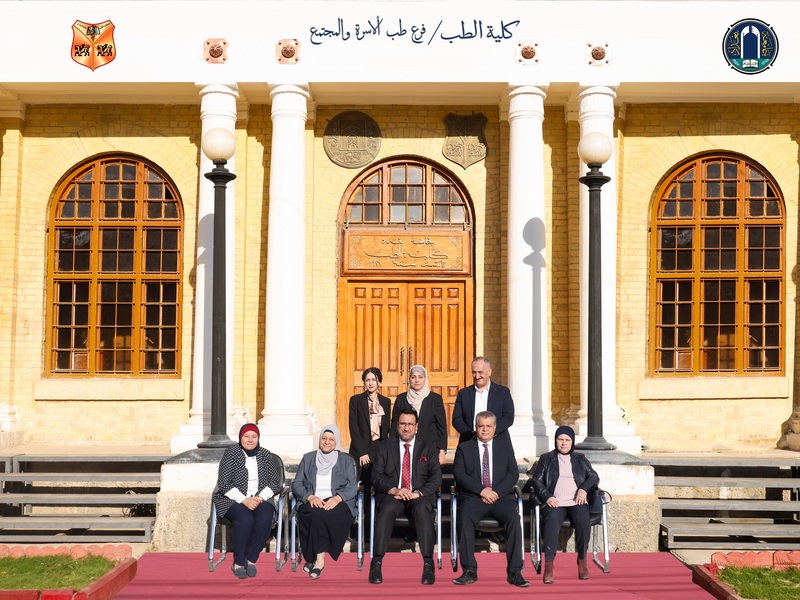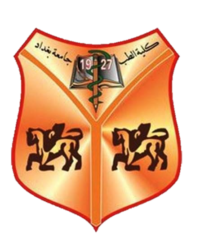
The initial structure of the Community Medicine Department dates back to the establishment of the Royal College of Medicine in Iraq in 1927. The first head of the Community Medicine Department at that time was Dr. Kirkley, a British national.
Tasks:
The Community Medicine course in the second and third years (and the fourth stage where research is conducted and presented) includes Epidemiology, Statistics, Nutrition, Public Health, Family Medicine, and others. It grants specializations such as the Higher Diploma equivalent to a Master's degree in Family Medicine, the Higher Diploma equivalent to a Master's degree in Field Epidemiology, Master's degree in Community Medicine, and a Doctorate (to be opened in the coming year). It contributes to the training of students from the Iraqi Board of Medical Specializations (Scientific Council of Community Medicine, Family Medicine, and Occupational Medicine), and teaches statistics to postgraduate students in other scientific branches at the College of Medicine.
Objectives:
First: Undergraduate Studies
The aim is to provide students during the second and third years (with research work and presentation in the fourth stage) with the basic knowledge of Community Medicine and the development of skills in Epidemiology and Statistics. Afterward, students will be able to deal with graphs, scientific tables, normal rates of vital indicators, discuss negative phenomena in human and community health, use this knowledge for prevention and control of health problems in society, acquire basic principles of scientific research, understand health policy strategies, and actively participate in graduating competent doctors to serve local, regional, and global health goals, as well as continue training and postgraduate studies.
Second: Postgraduate Studies
Including the Diploma, Master's, and Doctorate programs, the aim is to graduate qualified specialist doctors with professional (Diploma) and academic (Master's and Doctorate) degrees to work in the Ministry of Health, Ministry of Higher Education and Scientific Research, other departments, and the admission requirements for postgraduate studies (Diploma, Master's, and Doctorate) are based on the regulations for application and admission in postgraduate studies.
Curriculum:
Second Year:
The Basic Public Health course is taught during the second year, including General Epidemiology, Environmental Health, and Occupational Health, with 25 theoretical hours and 15 practical hours during the second semester.
Third Year:
The Biostatistics course is taught during the third year with 22 theoretical hours and 48 practical hours during the first semester. The Nutrition course is also taught with 15 theoretical hours and 3 practical hours during the first semester. Additionally, the course covers Communicable Diseases with 24 theoretical hours and 3 practical hours during the first and second semesters, Chronic Disease Epidemiology, Maternal and Child Health, Primary Healthcare, and Health Administration with 39 theoretical hours and 15 practical hours during the second semester.
Fourth Year:
Supervision of students' scientific research work and discussions.
Scientific Achievements of the Department:
- Opening of Postgraduate Studies: The study of the Community Medicine Diploma was opened in 1972 and suspended in 2003, with a total of 194 diploma graduates during this period. It was followed by the opening of the Community Medicine Master's program in 1977, with 148 students obtaining the Master's degree. The study of the Doctorate in Community Medicine was opened for the period 1996-2006, with ten students obtaining the degree, and one student obtaining a Doctorate in Occupational Medicine. Based on the request of the Ministry of Health, the Applied Diploma program was opened, and 23 students graduated from it. The Professional Medicine Diploma program was opened for the period 1986-1999, and 27 students obtained the diploma. The Family Medicine Diploma equivalent to a Master's degree was opened in 2014, and 85 students have graduated and obtained the degree. The Field Epidemiology Higher Diploma program was opened in 2015, and 57 students have obtained the degree so far.
- Considered as a training center for students of the Iraqi Board of Medical Specializations - Community Medicine and later Family Medicine since 1989.
- Scientific cooperation and collaboration with ministries, government institutions, and humanitarian organizations regarding Community Medicine.
- The department members have contributed to the publication of numerous scientific books, including:
- Occupational Medicine by Prof. Hikmat Jameel.
- Epidemiology by Prof. Georges Abdel-Messih, Prof. Tahsin Ma'la, and Prof. Abdel-Sattar Shahin.
- Rift Valley Fever by Prof. Saadoon Khalifa and others.
- Better Life (1st edition) by Dr. Jawad Al-Diwan and others.
- Better Life (2nd edition) by Dr. Nada Al-Ward and others.
- Preparation of various newsletters for professional, industrial, and civil society institutions.
- Scientific research in various medical fields published by the professors in Iraqi, Arab, and foreign scientific journals.
Excellence in public health, family medicine practice, epidemiology, and scientific research to serve the local and global community.
Training students on:
- Analyzing and measuring the health status of the community
- Identifying and prioritizing community health problems and managing them, including communicable, non-communicable, reproductive, nutritional, and injury-related diseases
- Developing appropriate, cost-effective, and technically sound interventions for the prevention and control of common diseases in the community, taking into account the community's structure and situation
- Promoting health through health education and enhancing community health security
- Effective leadership of healthcare teams at the primary healthcare level
- Lifelong learning
- Planning and conducting local work to provide evidence for decision-makers
- Developing public health policies and designing and implementing health programs
- Evaluating health activities and programs
- Critical evaluation of available evidence
Training students in:
- Ability to analyze community health data
- Ability to identify and manage priority health problems affecting the community
- Ability to prevent and control priority health and community problems through feasible interventions
- Ability to work within a team with leadership skills
- Ability to solve community health problems through research
- Ability to evaluate health programs and draw conclusions based on evidence
- Ability to critically appraise evidence
Academic Staff – Department of Community Medicine
For a complete and regularly updated list of faculty members in the Community Medicine department, please visit the University of Baghdad Community Medicine Repository .

